Overview
The article “7 Essential Insights on Oral Weight Loss Medications” examines the effectiveness and considerations associated with oral weight loss medications, specifically GLP-1 therapies such as orforglipron and oral semaglutide. These medications are noted for their ability to facilitate significant weight loss and enhance metabolic health. Furthermore, the article underscores the necessity of addressing potential side effects and the integration of nutrition to achieve sustainable results. By focusing on these aspects, the article provides valuable insights for those considering these treatment options.
Introduction
The landscape of weight management is evolving, with oral weight loss medications emerging as a pivotal solution for many individuals, particularly women navigating hormonal transitions. These medications not only deliver effective results but also provide a more accessible alternative to traditional injectable therapies.
As new options like orforglipron enter the market, it is essential to address questions regarding their safety, effectiveness, and long-term sustainability. Insights from the latest advancements in oral weight loss medications can guide individuals in leveraging these options to enhance their health journeys.
Tyde Wellness: Personalized GLP-1 Therapy for Effective Weight Loss
Tyde Wellness specializes in providing tailored solutions for women, particularly during significant life transitions such as postpartum recovery and menopause. By integrating doctor-led GLP-1 therapy with oral weight loss medications and personalized nutrition strategies, Tyde Wellness empowers women to achieve lasting results. This approach addresses not only the physical aspects of body mass management but also considers the emotional and psychological factors that can affect a woman’s health journey. Furthermore, the program’s adaptability allows participants to seamlessly incorporate their fitness goals into busy lifestyles, making it a practical choice for many.
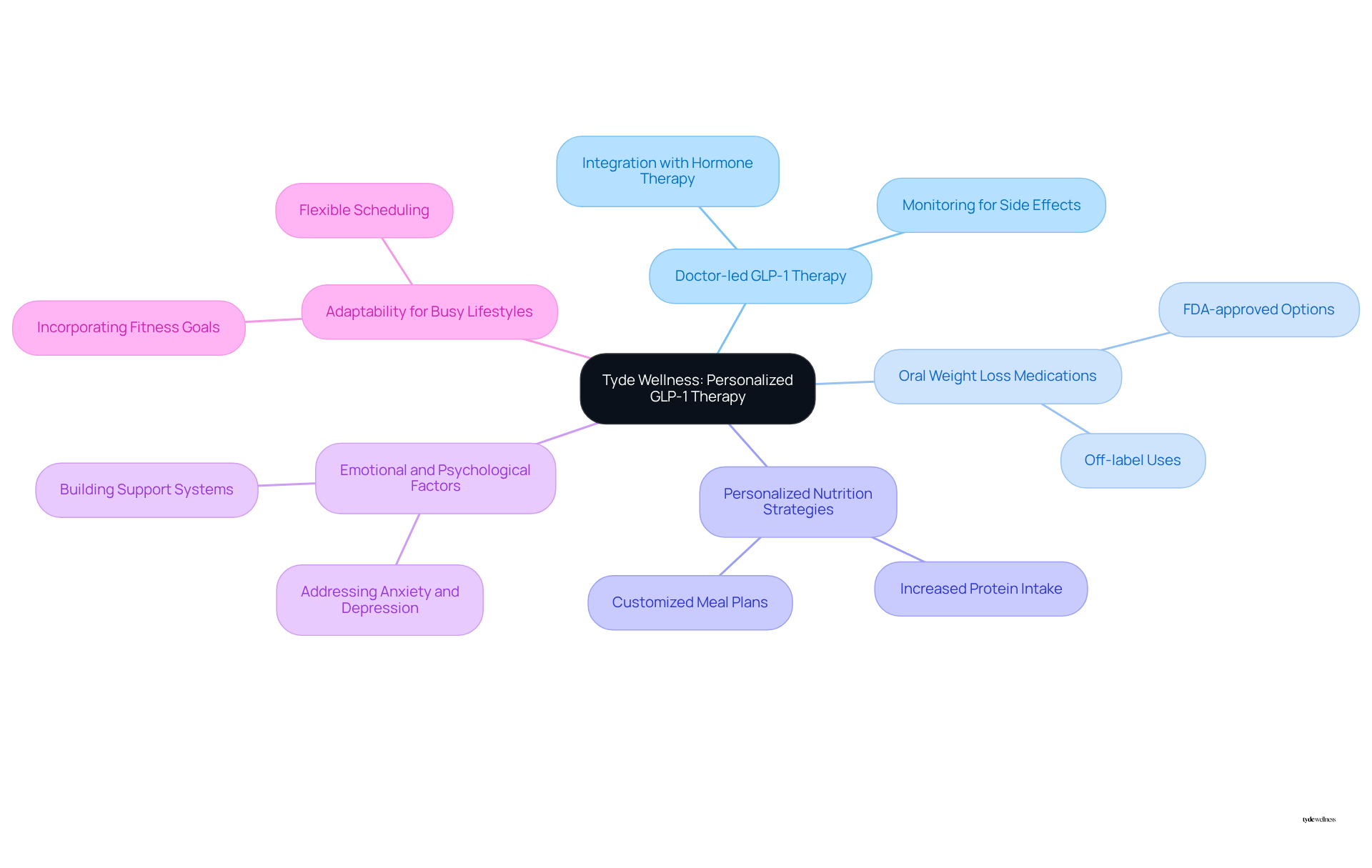
Orforglipron: A New Player in Oral Weight Loss Medications
Orforglipron represents a significant advancement in oral receptor agonists, having recently completed Phase 3 trials, notably the ACHIEVE-1 trial, which underscores its considerable effectiveness in reducing body mass. This innovative medication serves as a convenient option among oral weight loss medications, providing an alternative to traditional injectable GLP-1 therapies and enhancing accessibility for patients who may prefer pills over injections.
In clinical trials, participants who received the 36 mg dose of orforglipron experienced an average weight loss of 16 lbs (approximately 7.3 kg) over nine months, demonstrating results comparable to those achieved with injectable options. Furthermore, orforglipron lowered A1C levels by an average of 1.3% to 1.6%, making it a promising choice for individuals managing type 2 diabetes.
With these encouraging outcomes, orforglipron has the potential to transform management strategies for women, particularly those navigating life transitions such as postpartum recovery or menopause, by offering a more user-friendly approach to effectively managing their bodies.
Julia Chou, Chief Operating Officer, emphasizes, “It’s a privilege, ultimately, to continue to create the impact that we want to continue to have for clinicians, patients, and other members of the healthcare ecosystem.”
However, it is important to consider potential side effects such as nausea and diarrhea when evaluating this medication. Tyde Wellness’s approach further highlights adaptability and availability, enabling participants to seamlessly integrate their journey toward a healthier body into their everyday routines.
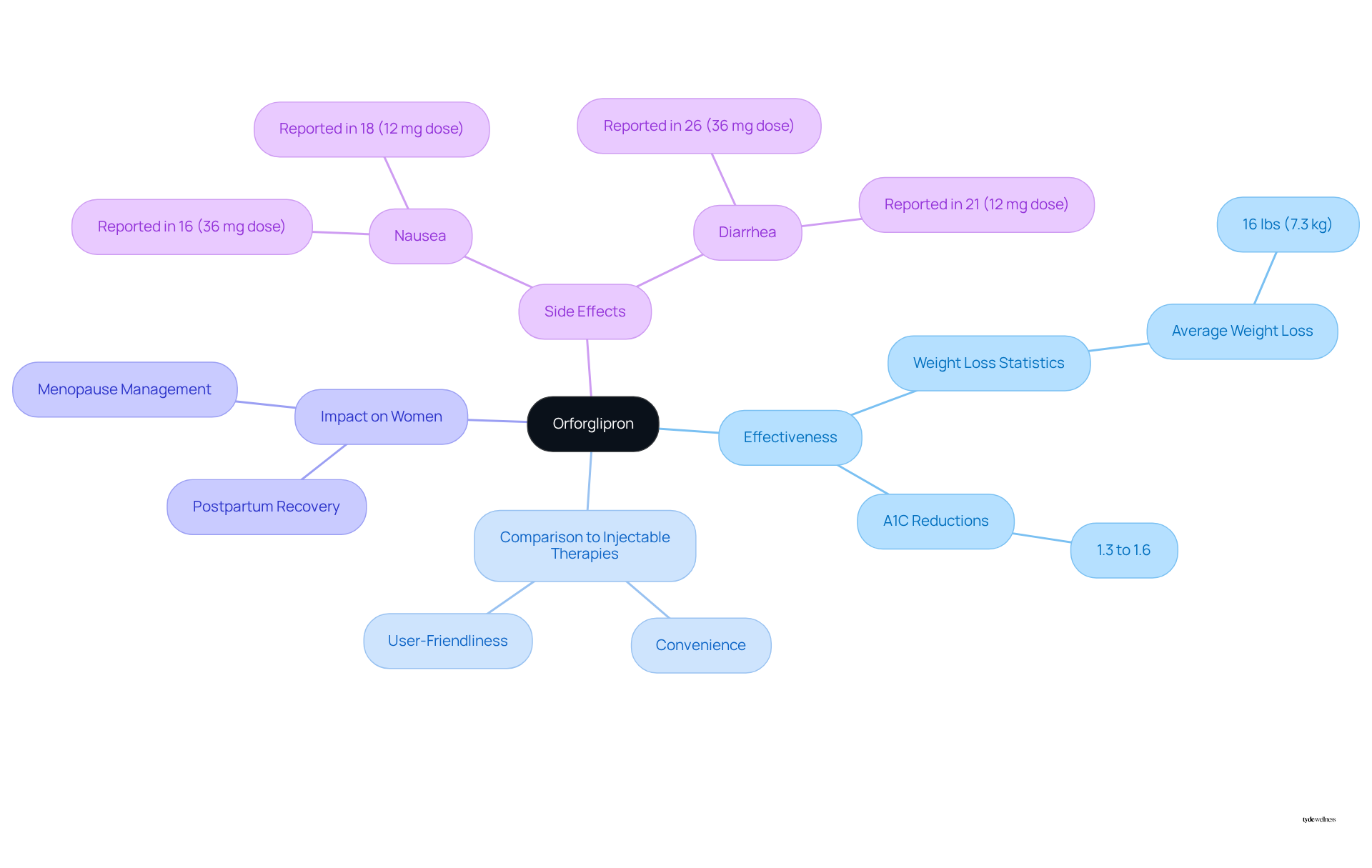
Oral Semaglutide (Rybelsus): Proven Efficacy in Weight Management
Oral weight loss medications, such as oral semaglutide known as Rybelsus, have proven effective in managing body mass for individuals with obesity, particularly women undergoing hormonal changes. Clinical trials indicate that participants can achieve an average reduction of approximately 15% within a year. Notably, many individuals in the Tyde Wellness program report an average body reduction of 15% after 68 weeks, with some experiencing decreases exceeding 20-25% within the same timeframe.
This medication functions by mimicking the GLP-1 hormone, which is essential in regulating appetite and food intake. For women facing menopause, Rybelsus is a scientifically validated approach to body mass reduction that effectively supports lifestyle changes and can be considered among oral weight loss medications. Its ability to assist in managing body mass during this transitional phase positions it as a valuable component of their health strategies.
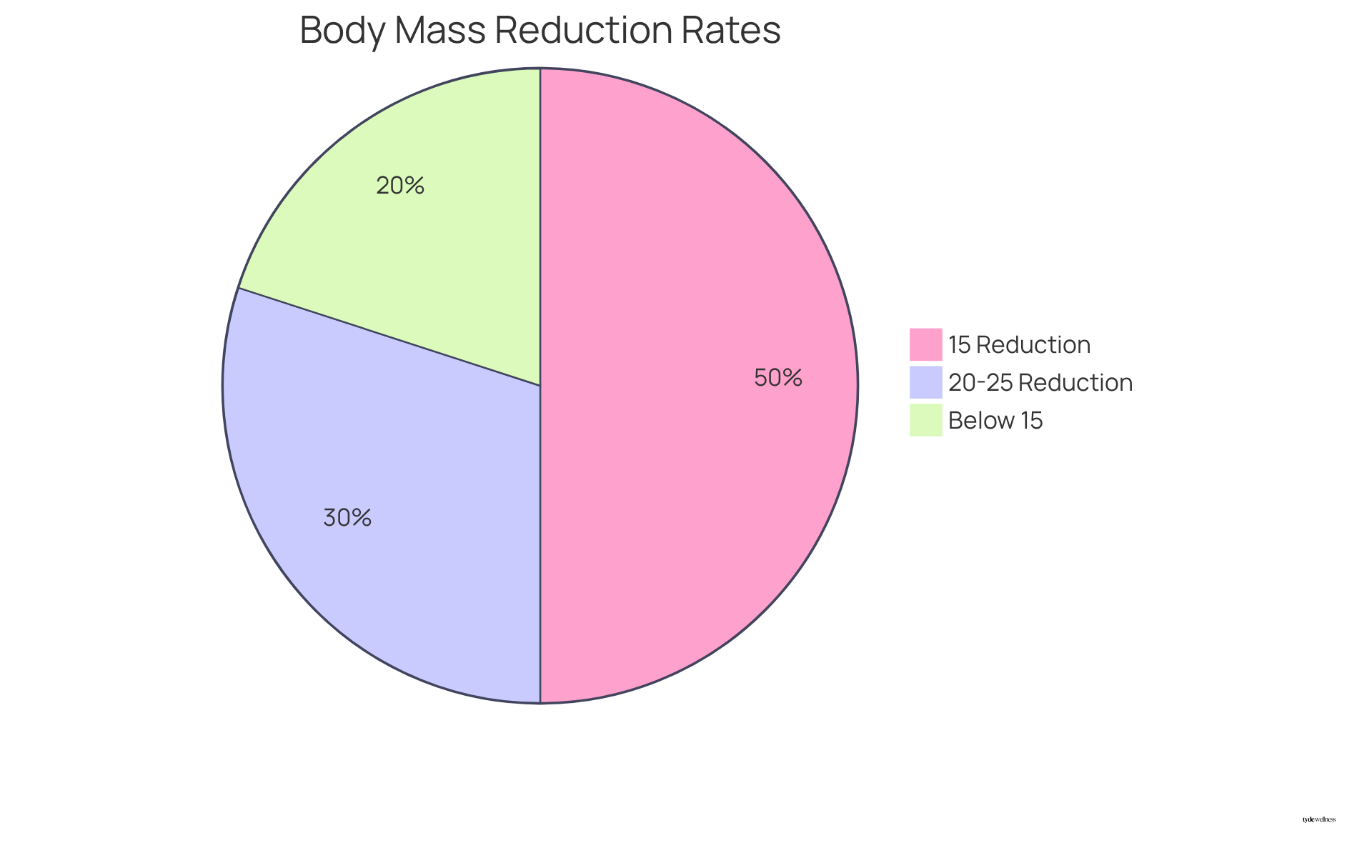
Safety and Tolerability: Key Considerations for Oral Weight Loss Medications
When assessing oral weight loss medications, especially GLP-1 therapies like oral semaglutide and orforglipron, safety and tolerability are essential considerations. Commonly reported side effects include gastrointestinal issues like nausea, vomiting, and diarrhea, which were noted in 62% of participants in trials. Many individuals experience a reduction in these side effects over time, leading to improved tolerability. It is vital for patients to maintain open communication with healthcare providers to monitor their reactions to these medications and make necessary dosage adjustments.
As Dr. Julio Rosenstock pointed out, the ACHIEVE-1 trial demonstrated clinically significant decreases in body mass, underscoring the importance of effectively managing side effects. This proactive approach not only enhances the safety profile of these medications but also empowers individuals to navigate their weight loss journeys with greater confidence. Understanding these dynamics can significantly impact the overall experience and outcomes for those pursuing effective management solutions.
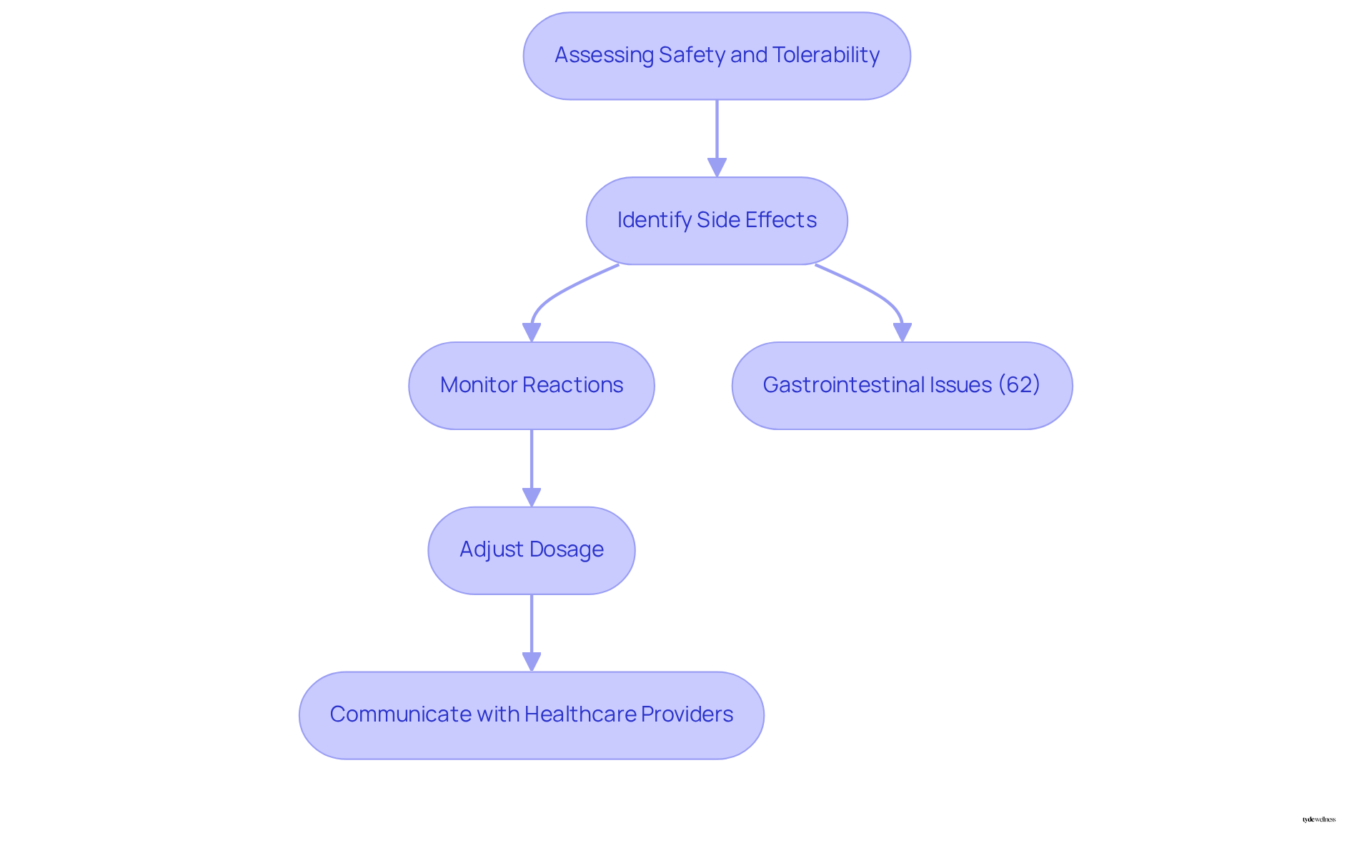
GLP-1 Medications: Transforming the Approach to Obesity Treatment
These therapies, particularly oral weight loss medications, have revolutionized obesity management by efficiently addressing the underlying factors of weight gain. Oral weight loss medications enhance satiety, curb appetite, and improve metabolic health, providing a comprehensive approach that surpasses traditional dieting methods. For women, particularly those navigating hormonal fluctuations during life transitions such as postpartum or menopause, oral weight loss medications, including GLP-1, can be especially beneficial. These oral weight loss medications allow women to achieve and maintain their health objectives more effectively.
Participants in programs like Tyde Wellness report an average weight loss of 15% after 68 weeks, with many achieving over 20-25% within a year. This statistic underscores the effectiveness of this therapy in promoting lasting health transformations. The mechanisms of action for these drugs involve promoting insulin release and lowering glucagon levels, which together aid in the enhanced management of body mass and metabolic well-being.
As obesity experts emphasize, incorporating oral weight loss medications into tailored programs for reducing body mass signifies significant progress in addressing the unique challenges women face in controlling their body size.
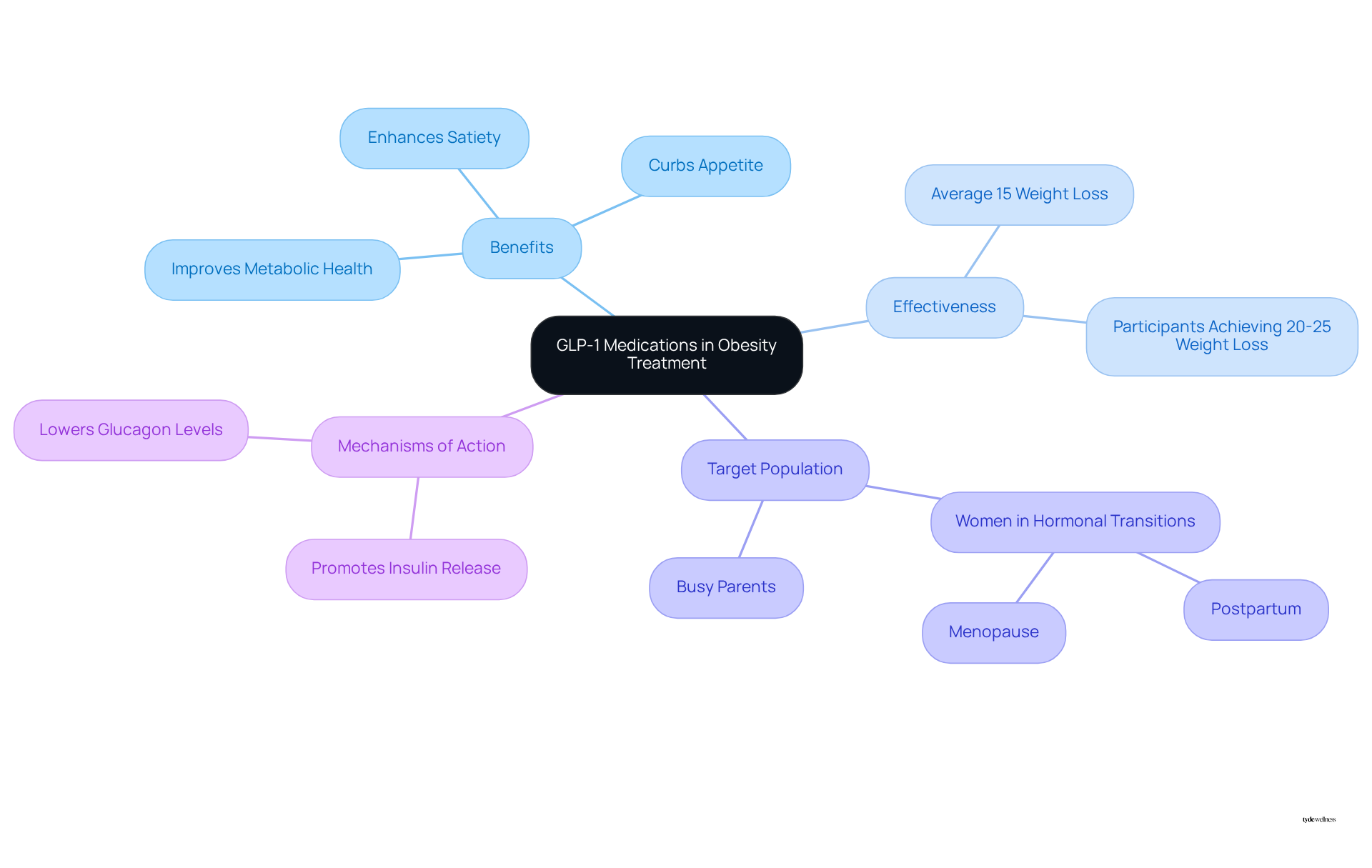
Effectiveness Comparison: Oral vs. Injectable Weight Loss Medications
When assessing oral and injectable GLP-1 treatments for reducing body mass, both alternatives demonstrate effectiveness, yet they cater to different patient needs. Injectable treatments, such as Ozempic and Wegovy, consistently yield superior weight loss outcomes, with average reductions often exceeding 20% in clinical trials. Furthermore, these injectable options offer cardiovascular benefits, making them particularly advantageous for patients with related health concerns. In contrast, oral treatments like Rybelsus and the newly researched orforglipron provide the convenience of daily dosing without the discomfort of injections, appealing to individuals who prefer a non-invasive method.
Patient satisfaction rates tend to favor injectables due to their effectiveness and the convenience they offer; many patients report greater adherence and satisfaction with weekly injections compared to the strict daily schedules required for oral treatments, which can complicate compliance. Research indicates that once patients understand the requirements of both options, many shift their preference from pills to injections, underscoring the importance of personalized medical advice in this decision-making process. As Dr. Craig Primack notes, “The reason for this is because the dose of the injectable form achieves higher blood levels and, therefore, better appetite control.”
Ultimately, the choice between oral and injectable forms should be guided by individual preferences, lifestyle considerations, and medical recommendations. Consulting with a healthcare provider can ensure that each patient identifies the most suitable option for their journey to reduce body mass.
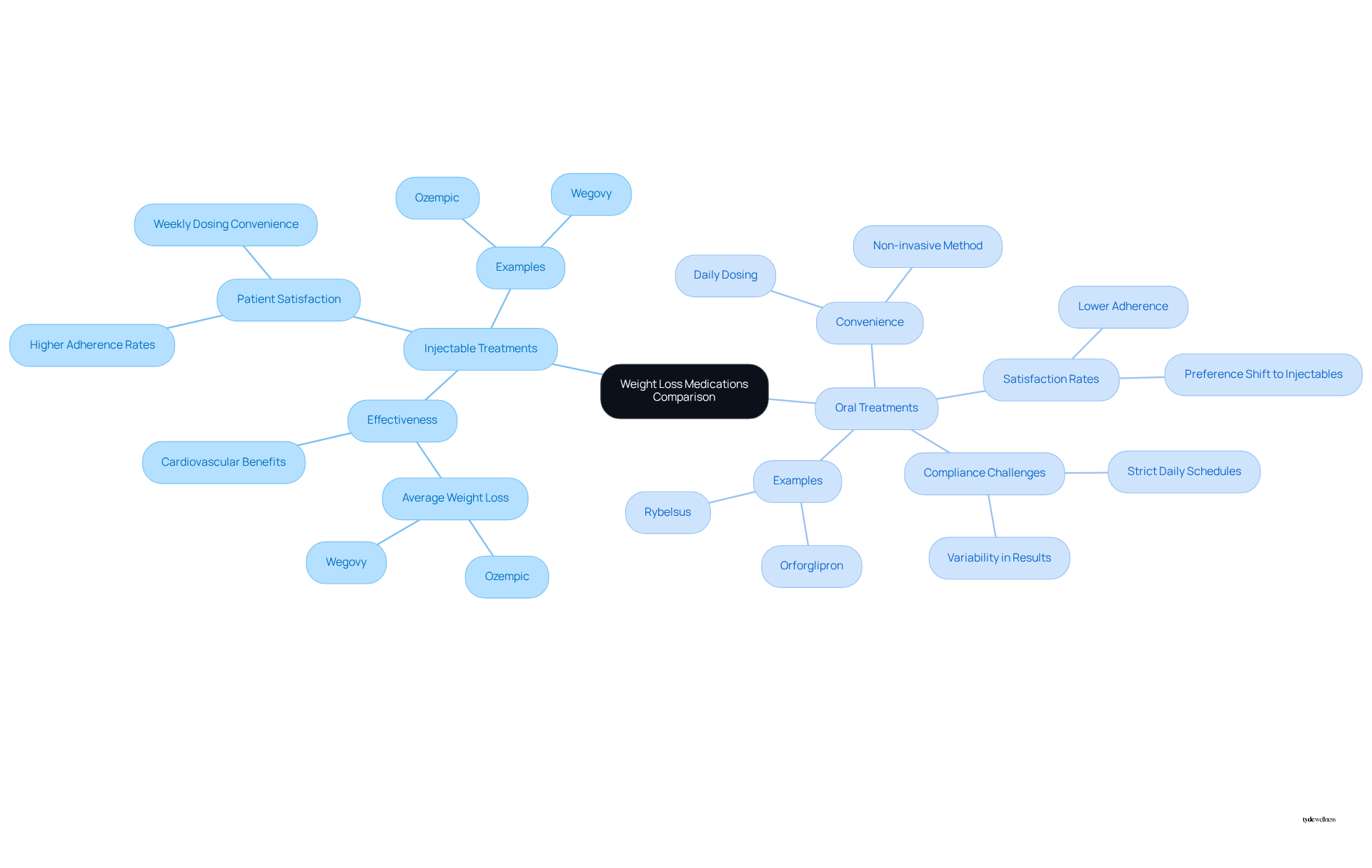
Long-Term Use: Sustainability of Oral Weight Loss Medications
Maintaining a healthy body size through oral treatments is a crucial element for individuals seeking long-term management strategies. Studies indicate that while many individuals achieve significant reductions in body mass with oral weight loss medications such as oral semaglutide and orforglipron, sustaining these outcomes can be challenging. Notably, only 15% of patients continued their GLP-1 treatment after two years, highlighting the difficulties in preserving body mass reductions. Continuous use of these medications may be essential for ongoing success.
Furthermore, integrating these treatments with lifestyle modifications—such as improved nutrition and regular physical activity—can significantly enhance long-term outcomes. For instance, participants in Tyde Wellness’s program reported an average reduction in body mass of 15% after 68 weeks, illustrating the effectiveness of a comprehensive approach. Collaborating with healthcare professionals to develop a personalized management strategy is vital for patients aiming to sustain their weight loss efficiently.
Additionally, addressing potential side effects, such as gastrointestinal issues, is crucial for ensuring adherence to treatment and overall success in managing body mass.
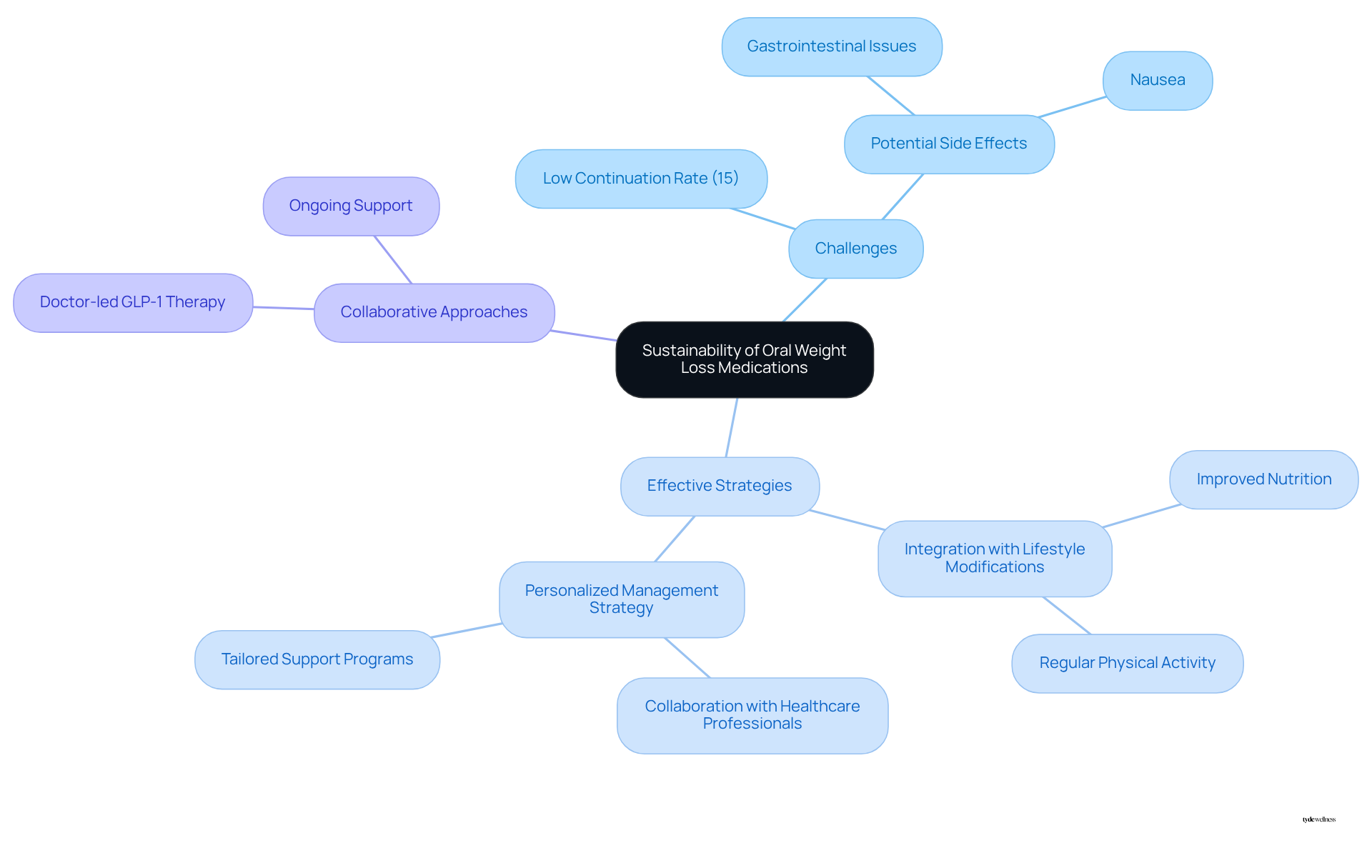
Nutrition Integration: Enhancing Weight Loss with Oral Medications
Incorporating nutrition into the journey of shedding pounds is essential for maximizing the benefits of oral treatments like GLP-1s. Patients are encouraged to adopt a balanced diet that emphasizes whole foods, including a variety of fruits, vegetables, lean proteins, and healthy fats. This dietary approach not only supports weight loss but also mitigates common side effects associated with certain treatments, such as nausea and cravings.
By collaborating closely with licensed nutritionists, individuals can create customized meal plans that align with their treatment schedules. These plans should prioritize nutrient density to ensure sufficient intake of essential vitamins and minerals while promoting satiety. For instance, including 20 to 30 grams of protein in every meal can help preserve muscle mass and enhance feelings of fullness, which is particularly important since some medications may reduce appetite.
Dietitians recommend consuming small, frequent meals to manage reduced appetite and sustain energy levels. Additionally, increasing protein intake by 50-100% from sources such as fish, eggs, and nuts can further support weight loss efforts. Staying hydrated is also vital, with recommendations to drink 2 to 3 liters of fluid daily, primarily from water.
Success stories from individuals who have made dietary changes alongside their GLP-1 treatment highlight the effectiveness of this combined approach, often resulting in a weight reduction of over 20-25% within a year. By prioritizing nutrition and committing to ongoing lifestyle changes, patients can enhance their overall health and achieve sustainable results in body management.
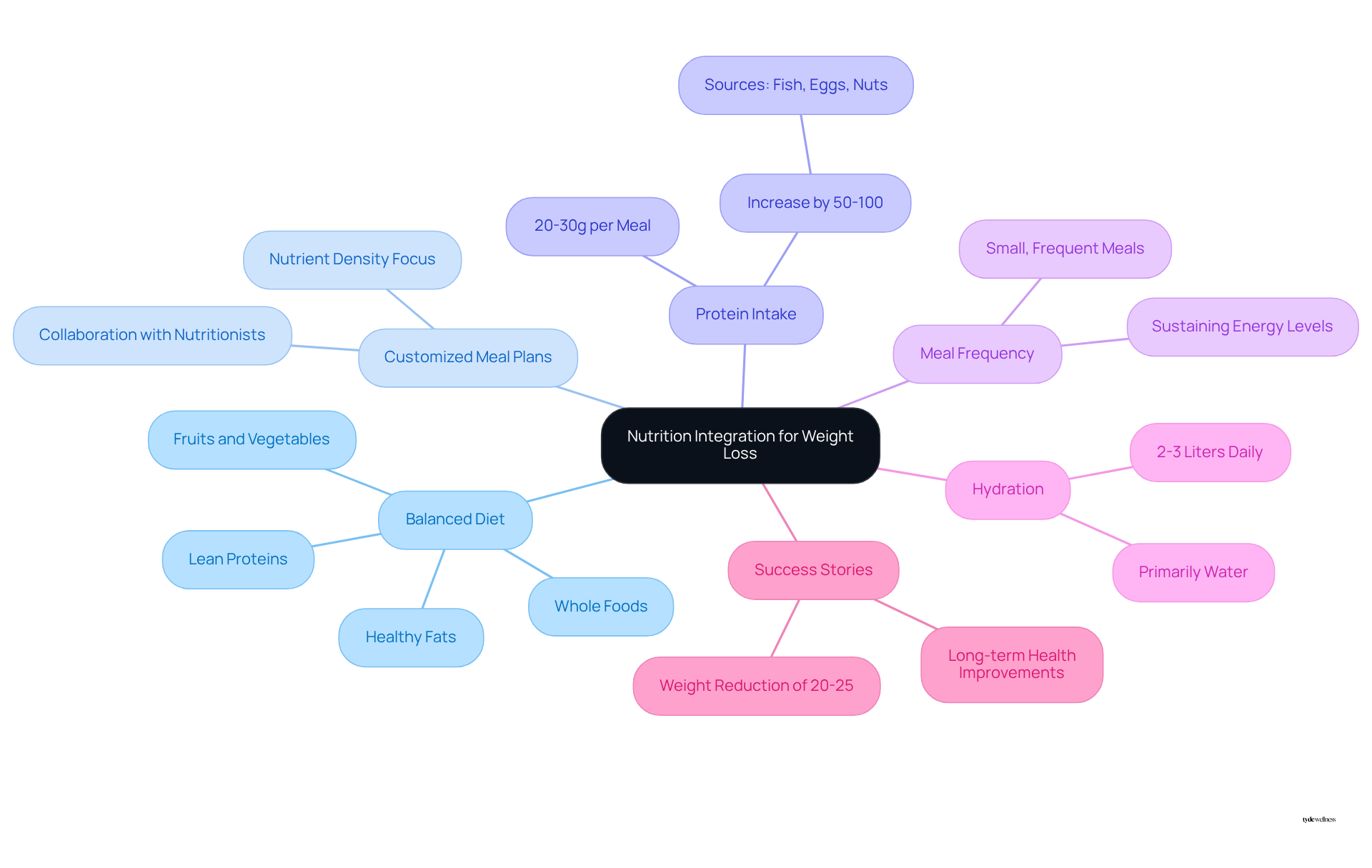
Potential Side Effects: What to Expect from Oral Weight Loss Medications
While oral weight loss medications such as orforglipron and oral semaglutide are generally well-tolerated, potential side effects can occur. Common side effects include gastrointestinal issues such as nausea, diarrhea, and constipation. Statistics indicate that gastrointestinal symptoms are frequently recognized as the most common side effects of oral weight loss medications, with many patients reporting improvements over time as their bodies adapt to these medications. For instance, nearly 400 cases of severe pancreatic issues have been documented among users of oral weight loss medications, and brochures suggest that pancreatitis affects one in 100 users.
Healthcare providers stress the importance of open communication regarding any side effects experienced. Adjustments to dosage or dietary modifications can often alleviate discomfort. For example, health writer Lisa Catanese recommends managing nausea by staying hydrated and consuming smaller, more frequent meals. Similarly, constipation may improve with increased fiber intake and adequate water consumption. Furthermore, patients should be aware of the potential for severe side effects, such as acute pancreatitis, which has been linked to GLP-1 treatments.
Patients are encouraged to share their experiences with side effects of oral weight loss medications, as this dialogue can lead to more effective management strategies. Understanding these potential side effects enables individuals to navigate their weight loss journey with enhanced confidence and support.
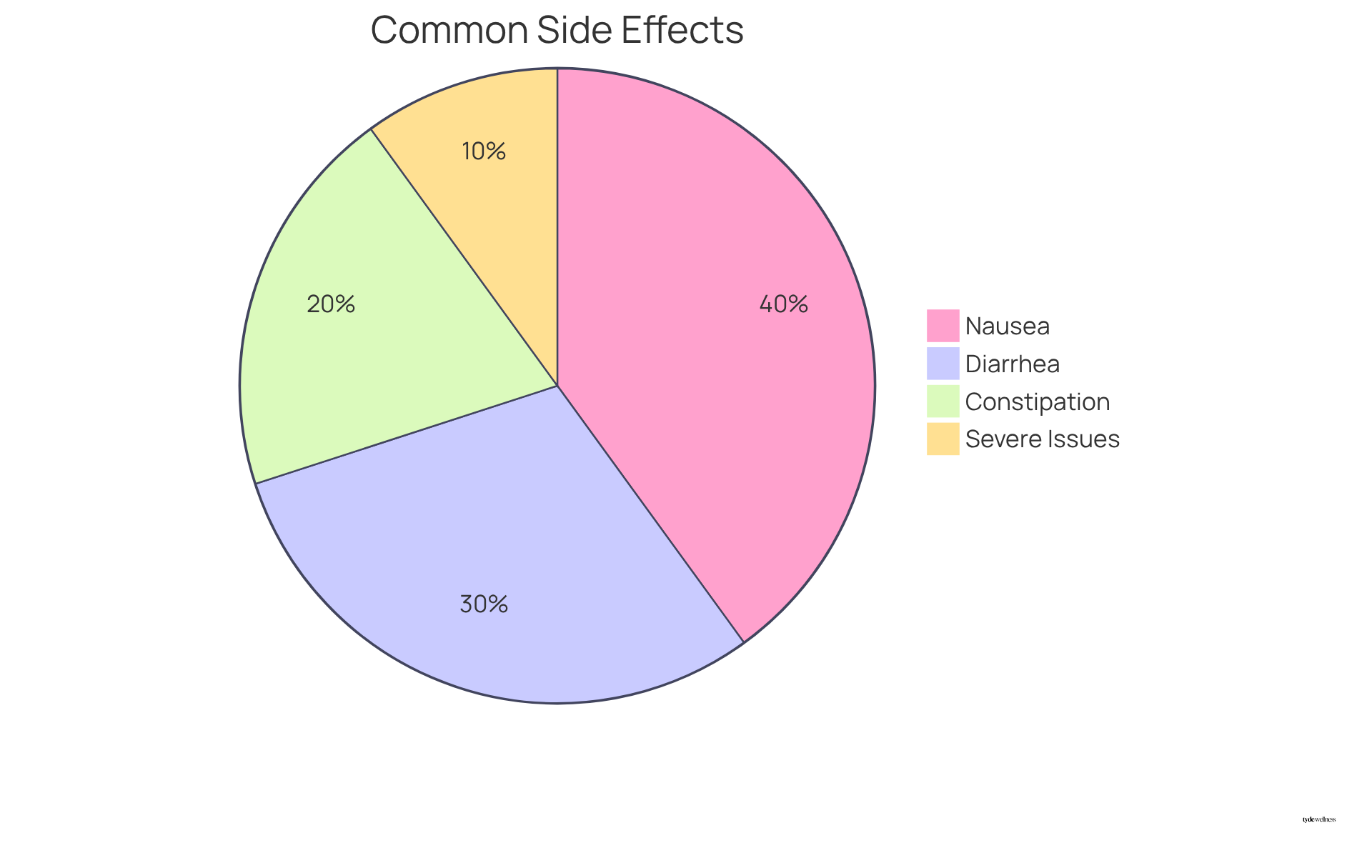
Future Trends: The Evolution of Oral Weight Loss Medications
The landscape of oral weight loss medications for reducing body mass is undergoing significant transformation, driven by ongoing research and development focused on enhancing both effectiveness and safety. New GLP-1 treatments are on the horizon, promising improved results in body mass reduction with fewer side effects.
For instance, recent advancements indicate that combination therapies, such as Novo Nordisk’s CagriSema, have shown a 22.7% reduction in body mass after 68 weeks, potentially offering more comprehensive solutions for managing body composition. Furthermore, the obesity drug pipeline is highly competitive, with several promising candidates anticipated to enter the market soon. This includes a ‘triple G’ medication that targets three GLP hormones, which may rival the effectiveness of bariatric surgery.
As Alyssa Billingsley, PharmD, notes, “CagriSema assisted individuals in shedding nearly 23% of their initial body mass over 68 weeks — surpassing Wegovy’s 16% reduction.”
As these innovations unfold, it is essential for individuals to stay informed and collaborate with healthcare providers to identify the most suitable options, such as oral weight loss medications, tailored to their unique health needs and weight loss goals.
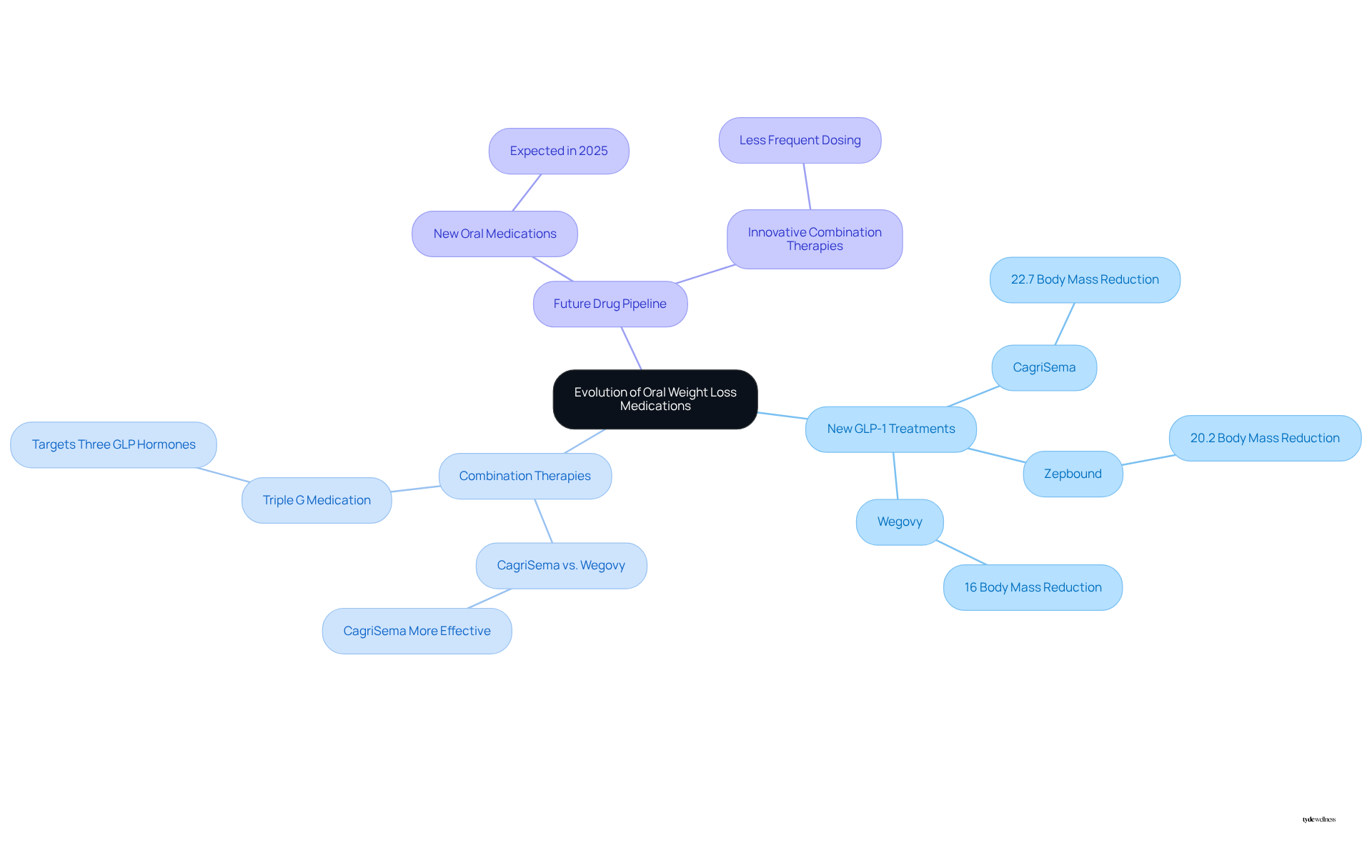
Conclusion
The exploration of oral weight loss medications presents a transformative approach to managing obesity, particularly for women undergoing significant life transitions. By incorporating innovative treatments like GLP-1 therapies, including orforglipron and oral semaglutide, alongside personalized strategies, individuals can achieve substantial weight loss while addressing both their physical and emotional health.
Key insights from the article emphasize the effectiveness of these medications, showcasing impressive results from clinical trials and real-world applications. Notably, participants in tailored programs, such as those provided by Tyde Wellness, report significant reductions in body mass, often exceeding 20% within a year. Moreover, considerations regarding safety, tolerability, and the integration of nutrition into treatment plans are essential for enhancing long-term success.
As the landscape of obesity treatment continues to evolve, it is crucial to stay informed about emerging oral weight loss medications and their potential benefits. Individuals aiming to manage their weight effectively should collaborate with healthcare professionals to develop personalized strategies that encompass both medication and lifestyle modifications, ensuring a holistic approach to lasting health and well-being.
Frequently Asked Questions
What is Tyde Wellness and what services does it offer?
Tyde Wellness specializes in personalized GLP-1 therapy for women, particularly during significant life transitions like postpartum recovery and menopause. They provide tailored solutions that integrate doctor-led GLP-1 therapy, oral weight loss medications, and personalized nutrition strategies to help women achieve lasting weight loss results.
How does Tyde Wellness address emotional and psychological factors in weight management?
Tyde Wellness considers both physical and emotional aspects of body mass management. Their approach acknowledges the psychological factors that can affect a woman’s health journey, aiming to provide comprehensive support throughout the weight loss process.
What is Orforglipron and what are its benefits?
Orforglipron is a new oral weight loss medication that has completed Phase 3 trials, showing significant effectiveness in reducing body mass. It offers a convenient alternative to traditional injectable GLP-1 therapies, allowing patients who prefer pills to manage their weight effectively.
What results have been observed in clinical trials for Orforglipron?
In clinical trials, participants taking a 36 mg dose of Orforglipron experienced an average weight loss of 16 lbs (approximately 7.3 kg) over nine months, with results comparable to injectable options. It also lowered A1C levels by an average of 1.3% to 1.6%, making it beneficial for individuals managing type 2 diabetes.
How does oral semaglutide (Rybelsus) work in weight management?
Oral semaglutide, known as Rybelsus, mimics the GLP-1 hormone, which regulates appetite and food intake. It has been proven effective in managing body mass for individuals with obesity, particularly women undergoing hormonal changes.
What are the average results for individuals using Rybelsus in the Tyde Wellness program?
Participants in the Tyde Wellness program using Rybelsus report an average body mass reduction of approximately 15% after 68 weeks, with some experiencing decreases exceeding 20-25% within the same timeframe.
Are there any side effects associated with Orforglipron?
Yes, potential side effects of Orforglipron include nausea and diarrhea, which should be considered when evaluating the medication.
How does Tyde Wellness support participants in integrating weight loss into their lifestyles?
Tyde Wellness emphasizes adaptability and availability in their programs, enabling participants to seamlessly incorporate their weight loss journey into their busy everyday routines.
List of Sources
- Tyde Wellness: Personalized GLP-1 Therapy for Effective Weight Loss
- Women turn to weight loss drugs in menopause: What to know about the benefits and risks (https://abcnews.go.com/GMA/Wellness/women-turn-weight-loss-drugs-menopause-benefits-risks/story?id=115067358)
- The Implications of GLP-1s on Women’s Healthcare (https://medscape.com/viewarticle/implications-glp-1s-womens-healthcare-2025a10009uh)
- Women in Menopause Benefit From GLP-1 Weight-Loss Medications as Much as Younger Women | Research | Advances in Endocrinology, and Women’s Health | NewYork-Presbyterian (https://nyp.org/advances/article/women-in-menopause-benefit-from-glp-1-weight-loss-medications-as-much-as-younger-women)
- Combining Hormone Replacement Therapy and GLP-1s: A Dual Approach to Support Weight Loss in Menopausal Women – ScriptWorks, Compounding Pharmacy in Walnut Creek, California (https://scriptworksrx.com/blog/menopausal-weight-loss-bhrt-estrogen-glp-1-agonists-california)
- Menopause Hormone Therapy Boosts GLP-1 Drug Effectiveness, Researchers Say (https://usnews.com/news/health-news/articles/2025-07-14/menopause-hormone-therapy-boosts-glp-1-drug-effectiveness-researchers-say)
- Orforglipron: A New Player in Oral Weight Loss Medications
- Healthy Returns: New weight loss drug data show Eli Lilly is gaining ground (https://cnbc.com/2025/06/25/healthy-returns-eli-lilly-novo-nordisk-release-weight-loss-drug-data.html)
- New daily weight-loss pill shows success at clinical trial (https://theguardian.com/society/2025/apr/17/new-daily-weight-loss-pill-orforglipron-success-clinical-trial-diabetes)
- Lilly’s oral GLP-1, orforglipron, showed compelling efficacy and a safety profile consistent with injectable GLP-1 medicines, in complete Phase 3 results published in The New England Journal of Medicine | Eli Lilly and Company (https://investor.lilly.com/news-releases/news-release-details/lillys-oral-glp-1-orforglipron-showed-compelling-efficacy-and)
- Oral Semaglutide (Rybelsus): Proven Efficacy in Weight Management
- Tim Chaffey (https://midwestapologetics.org/blog/insights/rybelsus-the-next-big-breakthrough-in-p66acs72-weight-loss)
- Novo says it’s submitted obesity pill for FDA approval (https://biopharmadive.com/news/novo-oral-semaglutide-fda-approval-application-obesity/745882)
- Novo Nordisk A/S: Rybelsus® (oral semaglutide 14 mg) demonstrates superior reduction in cardiovascular events in the SOUL trial at ACC 2025 (https://news-medical.net/news/20250401/Novo-Nordisk-AS-Rybelsusc2ae-(oral-semaglutide-14-mg)-demonstrates-superior-reduction-in-cardiovascular-events-in-the-SOUL-trial-at-ACC-2025.aspx)
- ADA 2025: Oral Semaglutide Demonstrates Cardiovascular Benefits in SOUL Trial (https://pharmacytimes.com/view/ada-2025-oral-semaglutide-demonstrates-cardiovascular-benefits-in-soul-trial)
- Safety and Tolerability: Key Considerations for Oral Weight Loss Medications
- Lilly’s oral GLP-1, orforglipron, demonstrated statistically significant efficacy results and a safety profile consistent with injectable GLP-1 medicines in successful Phase 3 trial | HFSA (https://hfsa.org/lillys-oral-glp-1-orforglipron-demonstrated-statistically-significant-efficacy-results-and-safety)
- Lilly’s oral GLP-1, orforglipron, showed compelling efficacy and a safety profile consistent with injectable GLP-1 medicines, in complete Phase 3 results published in The New England Journal of Medicine | Eli Lilly and Company (https://investor.lilly.com/news-releases/news-release-details/lillys-oral-glp-1-orforglipron-showed-compelling-efficacy-and)
- Oral, Subcutaneous Amycretin Similarly Safe, Tolerated as GLP-1 Monoagonists – American College of Cardiology (https://acc.org/Latest-in-Cardiology/Journal-Scans/2025/07/02/14/43/Oral-Subcutaneous-Amycretin)
- GLP-1 Medications: Transforming the Approach to Obesity Treatment
- Health Rounds: GLP-1 obesity drugs may boost low testosterone (https://reuters.com/business/healthcare-pharmaceuticals/health-rounds-glp-1-obesity-drugs-may-boost-low-testosterone-2025-07-16)
- GLP-1 Receptor Agonists: Shifting Obesity Management – OHE (https://ohe.org/insights/glp-1-receptor-agonists-shifting-obesity-management)
- Companies seek a second obesity treatment revolution—in pill form (https://science.org/content/article/companies-seek-second-obesity-treatment-revolution-pill-form)
- Cleveland Clinic Research Finds Injectable Medications for Obesity Produce Smaller Weight Loss in A Real-World Setting, Compared to Randomized Clinical Trials (https://newsroom.clevelandclinic.org/2025/06/10/cleveland-clinic-research-finds-injectable-medications-for-obesity-produce-smaller-weight-loss-in-a-real-world-setting-compared-to-randomized-clinical-trials)
- Nutritional Priorities to Support GLP-1 Therapy for Obesity – American Society for Nutrition (https://nutrition.org/nutritional-priorities-to-support-glp-1-therapy-for-obesity)
- Effectiveness Comparison: Oral vs. Injectable Weight Loss Medications
- New GLP-1 Pill Shows Promise for Weight Loss and Diabetes Without Injections (https://today.com/health/diet-fitness/eli-lilly-weight-loss-pill-rcna214473)
- Comparing Oral vs. Injectable Semaglutide (https://forhers.com/blog/oral-semaglutide-vs-injectable)
- Shots vs. Pills: Which GLP-1 Medication Works Best? (https://pureway.com/blog/shots-vs.-pills-which-glp-1-medication-works-best)
- Lilly’s oral GLP-1, orforglipron, demonstrated statistically significant efficacy results and a safety profile consistent with injectable GLP-1 medicines in successful Phase 3 trial | Eli Lilly and Company (https://investor.lilly.com/news-releases/news-release-details/lillys-oral-glp-1-orforglipron-demonstrated-statistically)
- Long-Term Use: Sustainability of Oral Weight Loss Medications
- Exclusive: Most patients stop using Wegovy, Ozempic for weight loss within two years (https://reuters.com/business/healthcare-pharmaceuticals/most-patients-stop-using-wegovy-ozempic-weight-loss-within-two-years-analysis-2024-07-10)
- How safe are long-term oral weight loss meds? (https://aol.com/safe-long-term-oral-weight-115700008.html)
- Most people stop using Wegovy and Ozempic after 2 years, analysis finds (https://nbcnews.com/health/long-people-stay-ozempic-stop-2-years-analysis-shows-rcna161216)
- Long-term Success of GLP-1s Hinges on More Than Just a Prescription (https://now.tufts.edu/2025/06/04/long-term-success-glp-1s-hinges-more-just-prescription)
- Nutrition Integration: Enhancing Weight Loss with Oral Medications
- Long-term Success of GLP-1s Hinges on More Than Just a Prescription (https://now.tufts.edu/2025/06/04/long-term-success-glp-1s-hinges-more-just-prescription)
- Food and fitness make or break success on weight loss meds, report finds (https://abcnews.go.com/GMA/Wellness/food-fitness-make-break-success-weight-loss-meds/story?id=122324834)
- Tufts Experts Weigh in on New Generation of Weight Loss Medications | School of Medicine (https://medicine.tufts.edu/news-events/news/tufts-experts-weigh-new-generation-weight-loss-medications)
- Managing side effects: Nutrition and activity guidance issued for GLP-1 patients (https://medicalxpress.com/news/2025-07-side-effects-nutrition-guidance-issued.html)
- I Am Taking a GLP-1 Weight-Loss Medication—What Should I Know? (https://jamanetwork.com/journals/jamainternalmedicine/fullarticle/2836527)
- Potential Side Effects: What to Expect from Oral Weight Loss Medications
- GLP-1 diabetes and weight-loss drug side effects: (https://health.harvard.edu/staying-healthy/glp-1-diabetes-and-weight-loss-drug-side-effects-ozempic-face-and-more)
- Are the New Weight Loss Drugs Too Good to Be True? (https://magazine.ucsf.edu/weight-loss-drugs-too-good-to-be-true)
- Potentially fatal side effect of weight-loss drugs sparks new investigation (https://nypost.com/2025/07/06/health/potentially-fatal-side-effect-of-weight-loss-drugs-sparks-new-investigation)
- Pros and cons of weight-loss drugs (https://mayoclinic.org/healthy-lifestyle/weight-loss/in-depth/weight-loss-drugs/art-20044832)
- Future Trends: The Evolution of Oral Weight Loss Medications
- 2025’s weight loss revolution: New medications are changing the scale (https://plasticsurgery.org/news/articles/2025s-weight-loss-revolution-new-medications-are-changing-the-scale)
- Exploring The 2025 Obesity Drug Pipeline | PSG (https://psgconsults.com/blog/exploring-the-2025-obesity-drug-pipeline)
- 5 Projected GLP-1 Trends in 2025 – GoodRx (https://goodrx.com/classes/glp-1-agonists/glp-1-trends?srsltid=AfmBOopOJSHCibSAh5HHceQtSo6wRdVMg2G1xRR_fOTypKqtc5lWyXJX)
- New Weight Loss Drugs Aim to Rival Ozempic (https://everydayhealth.com/weight-management/could-one-of-these-drugs-be-the-next-ozempic)



